Seven Habits of Highly Effective People - Stephen R. Covey
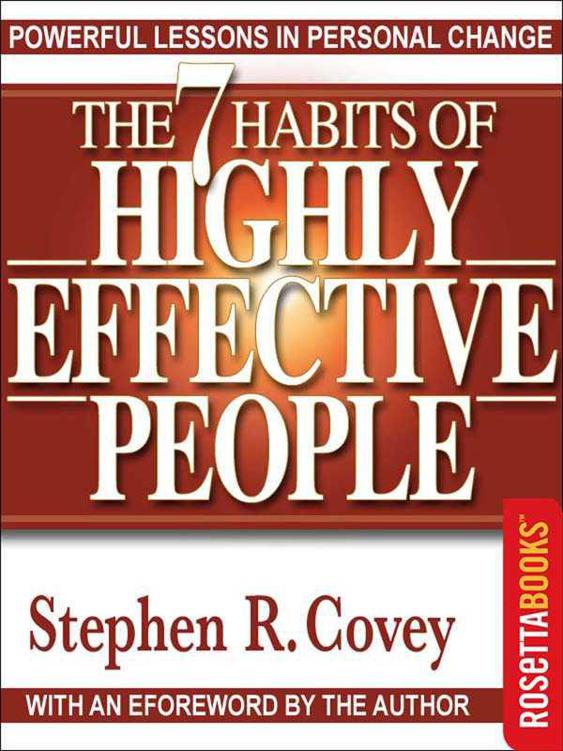
## Metadata
- Author: **Stephen R. Covey**
- Full Title: Seven Habits of Highly Effective People
- Category: #books
## Highlights
- > *We are what we repeatedly do.
> Excellence, then, is not an act, but a habit.*
ARISTOTLE ([View Highlight](https://read.readwise.io/read/01j1m589d8h9gxh5rvxmtej1yc))
- 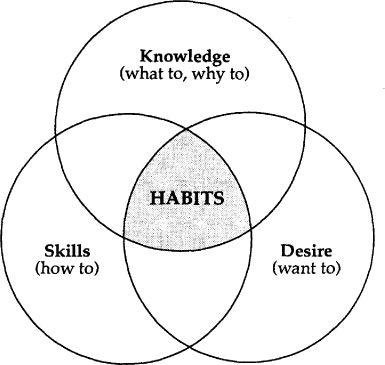 ([View Highlight](https://read.readwise.io/read/01j1m58fzvgbkqxpgc864pb13z))
- 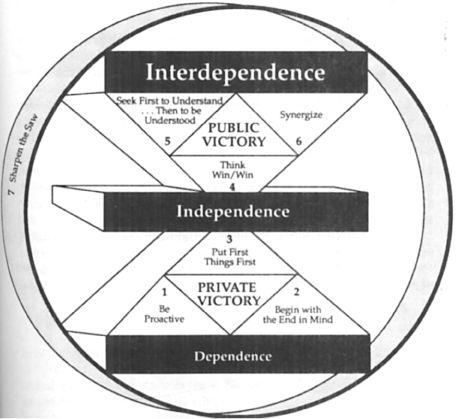 ([View Highlight](https://read.readwise.io/read/01j1m58mg6pyjqa64c53g4jfwk))
- HABIT 1
BE PROACTIVE ([View Highlight](https://read.readwise.io/read/01j1m58z7xr54ny9ets57vrntm))
- HABIT 2
BEGIN WITH THE END IN MIND ([View Highlight](https://read.readwise.io/read/01j1m59ktpqb4x7jgkvjstrtxb))
- • For a full day, listen to your language and to the language of the people around you. How often do you use and hear reactive phrases such as “If only,” “I can’t,” or “I have to”?
• Identify an experience you might encounter in the near future where, based on past experience, you would probably behave reactively. Review the situation in the context of your Circle of Influence. How could you respond proactively? Take several moments and create the experience vividly in your mind, picturing yourself responding in a proactive manner. Remind yourself of the gap between stimulus and response. Make a commitment to yourself to exercise your freedom to choose.
• Select a problem from your work or personal life that is frustrating to you. Determine whether it is a direct, indirect, or no control problem. Identify the first step you can take in your Circle of Influence to solve it and then take that step.
• Try the thirty-day test of proactivity. Be aware of the change in your Circle of Influence. ([View Highlight](https://read.readwise.io/read/01j1sgmc2z6pteszy2jt2y4n0k))
- HABIT 3
PUT FIRST THINGS FIRST ([View Highlight](https://read.readwise.io/read/01j1m59t4mzr2jw0g00mvr480q))
- • Take the time to record the impressions you had in the funeral visualization at the beginning of this chapter. You may want to use the chart below to organize your thoughts.
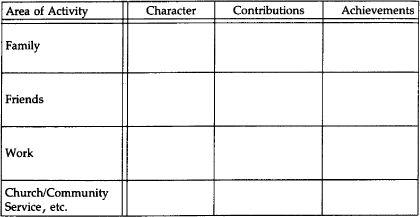
• Take a few moments and write down your roles as you now see them. Are you satisfied with that mirror image of your life?
• Set up time to completely separate yourself from daily activities and to begin work on your personal mission statement.
• Go through the chart in Appendix A showing different centers and circle all those you can identify with. Do they form a pattern for the behavior in your life? Are you comfortable with the implications of your analysis?
• Start a collection of notes, quotes, and ideas you may want to use as resource material in writing your personal mission statement.
• Identify a project you will be facing in the near future and apply the principle of mental creation. Write down the results you desire and what steps will lead to those results.
• Share the principles of Habit 2 with your family or work group and suggest that together you begin the process of developing a family or group mission statement. ([View Highlight](https://read.readwise.io/read/01j1sgj9s4g3q7rhqrw64cxc75))
- • Identify a Quadrant II activity you know has been neglected in your life—one that, if done well, would have a significant impact
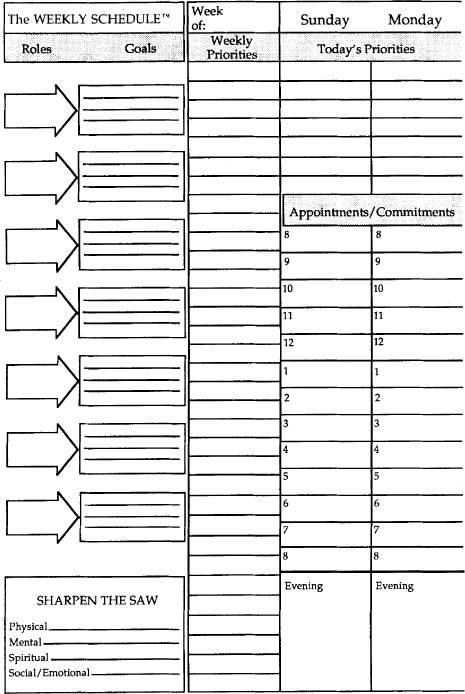
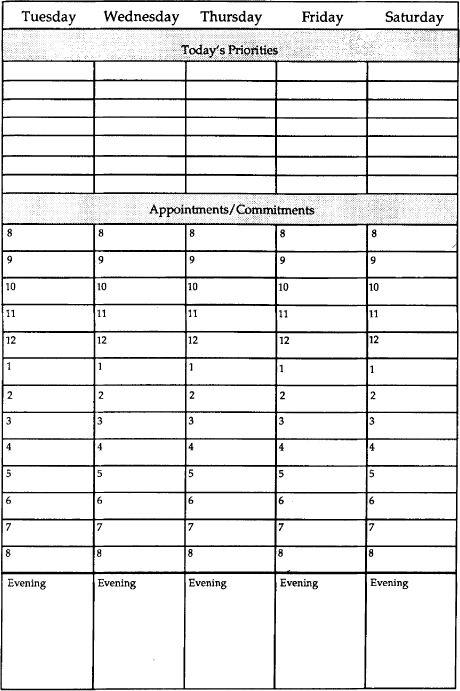
in your life, either personally or professionally. Write it down and commit to implement it.
• Draw a time management matrix and try to estimate what percentage of your time you spend in each quadrant. Then log your time for three days in fifteen-minute intervals. How accurate was your estimate? Are you satisfied with the way you spend your time? What do you need to change?
• Make a list of responsibilities you could delegate and the people you could delegate to or train to be responsible in these areas. Determine what is needed to start the process of delegation or training.
• Organize your next week.[*](#filepos430505) Start by writing down your roles and goals for the week, then transfer the goals to a specific action plan. At the end of the week, evaluate how well your plan translated your deep values and purposes into your daily life and the degree of integrity you were able to maintain to those values and purposes.
• Commit yourself to start organizing on a weekly basis and set up a regular time to do it.
• Either convert your current planning tool into a fourth generation; tool or secure such a tool.
• Go through “A Quadrant II Day at the Office” (Appendix B) for a more in-depth understanding of the impact of a Quadrant II paradigm. ([View Highlight](https://read.readwise.io/read/01j1n91s3f3rgvsfv410vhsk4j))
- HABIT 4
THINK WIN/WIN ([View Highlight](https://read.readwise.io/read/01j1m5a7rgt31f46hfk8gbfkyd))
- • Think about an upcoming interaction wherein you will be attempting to reach an agreement or negotiate a solution. Commit to maintain a balance between courage and consideration.
• Make a list of obstacles that keep you from applying the Win/Win paradigm more frequently. Determine what could be done within your Circle of Influence to eliminate some of those obstacles.
• Select a specific relationship where you would like to develop a Win/Win agreement. Try to put yourself in the other person’s place, and write down explicitly how you think that person sees the solution. Then list, from your own perspective, what results would constitute a Win for you. Approach the other person and ask if he or she would be willing to communicate until you reach a point of agreement and mutually beneficial solution.
• Identify three key relationships in your life. Give some indication of what you feel the balance is in each of the Emotional Bank Accounts. Write down some specific ways you could make deposits in each account.
• Deeply consider your own scripting. Is it Win/Lose? How does that scripting affect your interactions with other people? Can you identify the main source of that script? Determine whether or not those scripts serve well in your current reality.
• Try to identify a model of Win/Win thinking who, even in hard situations, really seeks mutual benefit. Determine now to more closely watch and learn from this person’s example. ([View Highlight](https://read.readwise.io/read/01j1sgkm8ex8wj2fy1zk9ged3h))
- HABIT 5
SEEK FIRST TO UNDERSTAND,
THEN TO BE UNDERSTOOD ([View Highlight](https://read.readwise.io/read/01j1m5acbvhmk2zj01w30mjhwx))
- HABIT 6
SYNERGIZE ([View Highlight](https://read.readwise.io/read/01j1m5agj2rzpk7jjmp31mn4ch))
- • Select a relationship in which you sense the Emotional Bank Account is in the red. Try to understand and write down the situation from the other person’s point of view. In your next interaction, listen for understanding, comparing what you are hearing with what you wrote down. How valid were your assumptions? Did you really understand that individual’s perspective?
• Share the concept of empathy with someone close to you. Tell him or her you want to work on really listening to others and ask for feedback in a week. How did you do? How did it make that person feel?
• The next time you have an opportunity to watch people communicate, cover your ears for a few minutes and just watch. What emotions are being communicated that may not come across in words alone?
• Next time you catch yourself inappropriately using one of the autobiographical responses—probing, evaluating, advising, or interpreting—try to turn the situation into a deposit by acknowledgment and apology. (”*I’m sorry, I just realized I’m not really trying to understand. Could we start again*?”)
• Base your next presentation on empathy. Describe the other point of view as well as or better than its proponents; then seek to have your point understood from their frame of reference. ([View Highlight](https://read.readwise.io/read/01j1sgks4rrg59edbze6wbdjqr))
- • Think about a person who typically sees things differently than you do. Consider ways in which those differences might be used as stepping-stones to third alternative solutions. Perhaps you could seek out his or her views on a current project or problem, valuing the different views you are likely to hear.
• Make a list of people who irritate you. Do they represent different views that could lead to synergy if you had greater intrinsic security and valued the difference?
• Identify a situation in which you desire greater teamwork and synergy. What conditions would need to exist to support synergy? What can you do to create those conditions?
• The next time you have a disagreement or confrontation with someone, attempt to understand the concerns underlying that person’s position. Address those concerns in a creative and mutually beneficial way. ([View Highlight](https://read.readwise.io/read/01j1sgkxv3c2b2sj6n9ahyvbsf))
- • Make a list of activities that would help you keep in good physical shape, that would fit your life-style and that you could enjoy over time.
• Select one of the activities and list it as a goal in your personal role area for the coming week. At the end of the week evaluate your performance. If you didn’t make your goal, was it because you subordinated it to a genuinely higher value? Or did you fail to act with integrity to your values?
• Make a similar list of renewing activities in your spiritual and mental dimensions. In your social-emotional area, list relationships you would like to improve or specific circumstances in which Public Victory would bring greater effectiveness. Select one item in each area to list as a goal for the week. Implement and evaluate.
• Commit to write down specific “sharpen the saw” activities in all four dimensions every week, to do them, and to evaluate your performance and results. ([View Highlight](https://read.readwise.io/read/01j1sgm2aavm80pes3s4bgj8k8))
- The way we see the problem *is* the problem. ([View Highlight](https://read.readwise.io/read/01j1qv9sj5v6ge3waf1h0vbe5s))
- We must not cease from exploration and the end of all our exploring will be to arrive where we began and to know the place for the first time. ([View Highlight](https://read.readwise.io/read/01j1n7he1zyrg1z2gz5v98k88g))
- “Sow a thought, reap an action; sow an action, reap a habit; sow a habit, reap a character; sow a character, reap a destiny ([View Highlight](https://read.readwise.io/read/01j1md4n5hx4qy3kmtpk95q8sm))
- Independent thinking alone is not suited to interdependent reality. Independent people who do not have the maturity to think and act interdependently may be good individual producers, but they won’t be good leaders or team players. They’re not coming from the paradigm of interdependence necessary to succeed in marriage, family, or organizational reality. ([View Highlight](https://read.readwise.io/read/01j1n7ff03nbans5ce3xc5ns2a))
- Effectiveness lies in the balance—what I call the P/PC Balance. *P* stands for *production* of desired results, the golden eggs. *PC* stands for *production capability,* the ability or asset that produces the golden eggs. ([View Highlight](https://read.readwise.io/read/01j1mgpmhzh0drvhfbkv20r2yw))
- Basically, there are three kinds of assets: physical, financial, and human. ([View Highlight](https://read.readwise.io/read/01j1mgnwetdhczmt66chfftzzh))
- > *I know of no more encouraging fact
> than the unquestionable ability of man
> to elevate his life by conscious endeavor.* ([View Highlight](https://read.readwise.io/read/01j1n9gg52yq21vv0wc43zbwav))
- 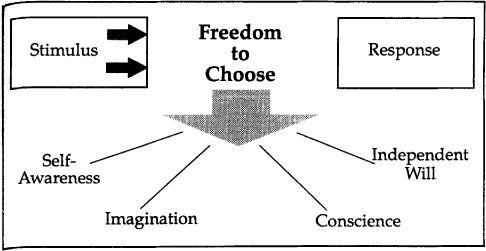 ([View Highlight](https://read.readwise.io/read/01j1n9h54znafq4tzbbm8f64tv))
- **Reactive Language**
**Proactive Language**
There’s nothing I can do.
Let’s look at our alternatives.
That’s just the way I am. I can choose a different approach. He makes me so mad. I control my own feelings. They won’t allow that. I can create an effective presentation. I have to do that. I will choose an appropriate response. I can’t. I choose. I must. I prefer. If only. I ([View Highlight](https://read.readwise.io/read/01j1n9kar5dmxznywvhazh0tcc))
- Another excellent way to become more self-aware regarding our own degree of proactivity is to look at where we focus our time and energy. We each have a wide range of concerns—our health, our children, problems at work, the national debt, nuclear war. We could separate those from things in which we have no particular mental or emotional involvement by creating a “Circle of Concern.” ([View Highlight](https://read.readwise.io/read/01j1qvcpsxczjafv2cg9afc1wn))
- What lies behind us and what lies before us
are tiny matters
compared to what lies within us. ([View Highlight](https://read.readwise.io/read/01j1qvdfdd9pnt1tm7fz23xzbt))
- Urgent things act on us. ([View Highlight](https://read.readwise.io/read/01j1n99rd0m054189vmdmkdj6x))
- 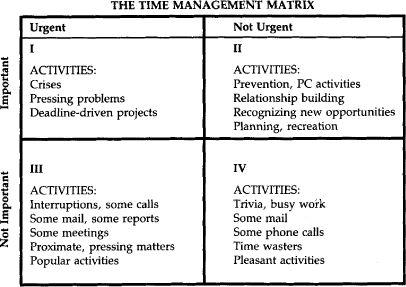 ([View Highlight](https://read.readwise.io/read/01j1n981v99xr5nx2xvtaa8m0r))
- 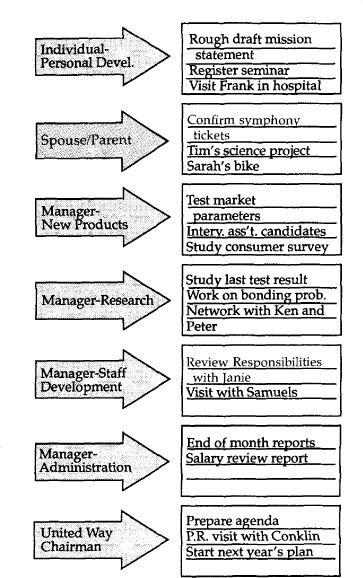 ([View Highlight](https://read.readwise.io/read/01j1n9507821kpzzgs5g6qtmn3))
- 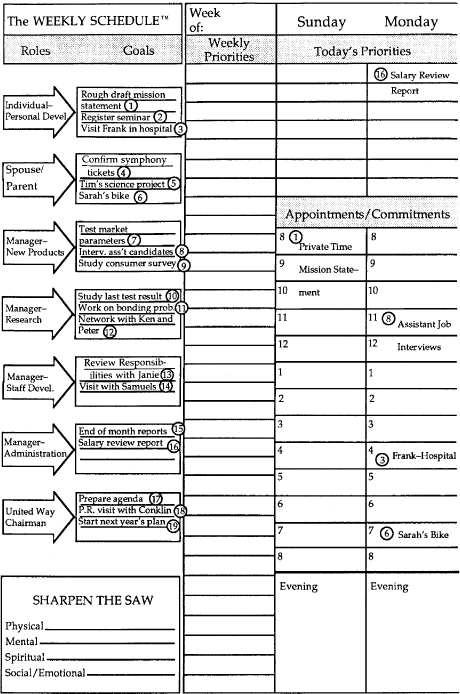 ([View Highlight](https://read.readwise.io/read/01j1n94hk1brax890wjx43w3b9))
- 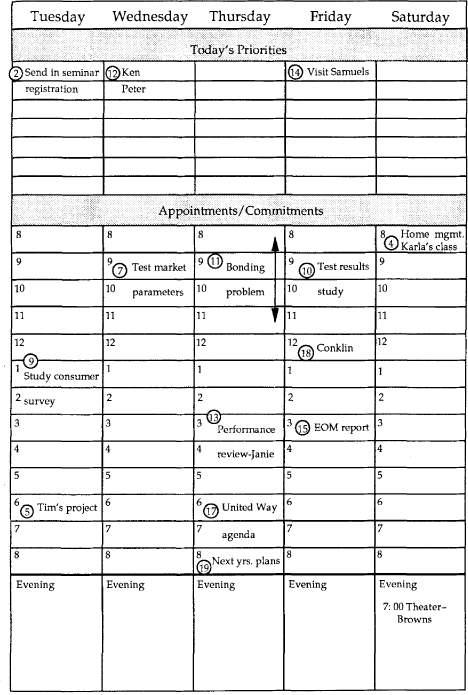 ([View Highlight](https://read.readwise.io/read/01j1n94ejyyqa1ntx2g53e12h3))
-  ([View Highlight](https://read.readwise.io/read/01j1n94bbs8zd7ga6y55aensz0))
- There can be no friendship without confidence,
and no confidence without integrity. ([View Highlight](https://read.readwise.io/read/01j1n7v34xw1v83fprrs88ks0x))
- An Emotional Bank Account is a metaphor that describes the amount of trust that’s been built up in a relationship. It’s the feeling of safeness you have with another human being. ([View Highlight](https://read.readwise.io/read/01j1n7wskqtsz2zjhycqpbe9g4))
- Tags: #relationships
- Really seeking to understand another person is probably one of the most important deposits you can make, and it is the key to every other deposit. ([View Highlight](https://read.readwise.io/read/01j1n8p30t7mjcnhjhqbcbthb6))
- The little kindnesses and courtesies are so important. Small discourtesies, little unkindnesses, little forms of disrespect make large withdrawals. In relationships, the little things are the big things. ([View Highlight](https://read.readwise.io/read/01j1n8qdqvef6a23b6jz9pgpcx))
- Keeping a commitment or a promise is a major deposit; breaking one is a major withdrawal. In fact, there’s probably not a more massive withdrawal than to make a promise that’s important to someone and then not to come through. The next time a promise is made, they won’t believe it. People tend to build their hopes around promises, particularly promises about their basic livelihood. ([View Highlight](https://read.readwise.io/read/01j1n8r3e6rwrpyy24c23c8q7t))
- Imagine the difficulty you might encounter if you and your boss had different assumptions regarding whose *role* it was to create your job description. ([View Highlight](https://read.readwise.io/read/01j1n8rma4d75f3ennspewfdeg))
- Personal Integrity generates trust and is the basis of many different kinds of deposits.
Lack of integrity can undermine almost any other effort to create high trust accounts. People can seek to understand, remember the little things, keep their promises, clarify and fulfill expectations, and still fail to build reserves of trust if they are inwardly duplicitous. ([View Highlight](https://read.readwise.io/read/01j1n8s5c4ez9w2ds19zpm0z11))
- When we make withdrawals from the Emotional Bank Account, we need to apologize and we need to do it sincerely. ([View Highlight](https://read.readwise.io/read/01j1n8sw0ch6b0y39g6k9937n4))
- I suggest that in an interdependent situation, *every P problem is a PC opportunity*—a chance to build the Emotional Bank Accounts that significantly affect interdependent production. ([View Highlight](https://read.readwise.io/read/01j1n8wtpm7ceyr4jq7zrvbt8z))
- Win/Win is a frame of mind and heart that constantly seeks mutual benefit in all human interactions. Win/Win means that agreements or solutions are mutually beneficial, mutually satisfying. With a Win/Win solution ([View Highlight](https://read.readwise.io/read/01j1n8zm2mj6yd4yprfcb786rr))